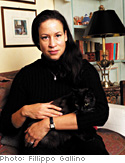Andrea Lee's Aha! Moment

The language, the food, the culture, the people are different—but soul is soul all over the world. An expatriate writer finds some southern comfort, Italian style.
It was a blistering afternoon in Perugia, part of a heat wave that besieged the beautiful Italian university town during last summer's jazz festival. I was sitting with my children at an outdoor café on a side street, eating lunch and eavesdropping on the exhausted English-speaking tourists and frazzled Italian waiters: a favorite family game, since, although we're American, we live in Italy and my kids—a 16-year-old daughter and 6-year-old son—are bilingual.Suddenly, as I was savoring a last forkful of buffalo mozzarella, I heard music coming from the piazza around the corner—music that roused me from my lazy afternoon trance like a jolt of espresso. It was a gospel song, sung by a choir at top volume with unmistakably African-American verve and passion, and, more than that, it was a song I knew well: "Touch the Hem of His Garment."
It touched off memories of countless Sundays when I sat, a little girl in a starched dress, white gloves, and a desperately uncomfortable dress-up hat, in a pew of the First African Baptist Church of Philadelphia, where my father was pastor for many years. The choral programs at Sunday services were divided between the classics of European sacred music and the beloved familiar numbers of the African-American tradition: spirituals and gospel hymns that seemed to me to well up from some profound underground spring of emotion.
So there it was, the music of my childhood, ringing out against the Roman and Etruscan stones of an ancient Italian city. Echoing through streets that had known the footsteps of Renaissance masters like Il Perugino and Raphael was a message to me about the unique strength of my own culture. "Let's go!" I said to my astonished kids. They goggled at me as I jumped up from the table, threw down some money for the waiter, and dragged them around the corner, toward the Piazza Quattro Novembre, where I knew I'd find onstage a black American gospel choir.
The music was getting louder, more ecstatic, with one woman's voice soaring above the chorus in a full, wailing solo. And as I hurried toward it, I mentally pledged allegiance once more to my roots and promised myself that those roots would not be lost to my children, however far from the United States they were growing up.
When I came out of the shady street into the blazing sunlight of the piazza, I had quite a shock. There was indeed a gospel choir on the stage, facing a large, enthusiastic audience...but it was a choir of young Italians whose identification placard said they came from a small town in the region of Calabria—not South Carolina or South Philadelphia, but southern Italy. And the woman whose voice rang out with gospel passion that swayed the crowd was a small, slight Italian girl with long blonde hair.
I stood there momentarily lost in a mixture of amazement and confusion that must have shown on my face, because my daughter patted my arm. "It's okay, Mom," she said, with the tone of exaggerated patience teenagers get when their elders are slow on the uptake. "They don't have to be black to sing gospel. They don't even have to be American. They just have to feel it—and they do."
And in a flash, I realized a number of things: that my children's experience was always going to be different from mine; that mixing a cultural heritage does not mean weakening it; and that if an African-American choir can sing Bach with authentic passion and beauty, there is no reason a choir from Calabria can't sing perfect gospel. Wasn't that why I had made a life in Italy—to add an extra dimension to my experience?
"It's better than okay," I said to my daughter. "It's wonderful." And I closed my eyes and joined in the final chorus, rocking in the heart of the crowd as if I were still at church back home.



